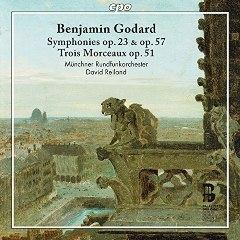Benjamin Godard - Symphony No. 2 ; Symphonie gothique, Op. 23; Trois Morceaux Op. 51 (2016)
Benjamin Godard - Symphony No. 2 ; Symphonie gothique, Op. 23; Trois Morceaux Op. 51 (2016)

1 Godard — Symphony No. 2 in B-Flat Major, Op. 57: I. Allegretto 2 Godard — Symphony No. 2 in B-Flat Major, Op. 57: II. Lento ma non troppo 3 Godard — Symphony No. 2 in B-Flat Major, Op. 57: III. Vivace 4 Godard — Symphony No. 2 in B-Flat Major, Op. 57: IV. Allegro con moto 5 Godard — 3 Morceaux, Op. 51: No. 1, Marche funebre 6 Godard — 3 Morceaux, Op. 51: No. 2, Bresilienne 7 Godard — 3 Morceaux, Op. 51: No. 3, Kermesse 8 Godard — Symphonie gothique, Op. 23: I. Maestoso 9 Godard — Symphonie gothique, Op. 23: II. Andantino quasi allegro 10 Godard — Symphonie gothique, Op. 23: III. Grave ma non troppo lento 11 Godard — Symphonie gothique, Op. 23: IV. Presto 12 Godard — Symphonie gothique, Op. 23: V. Allegro non troppo Münchner Rundfunkorchester David Reiland – conductor
Original French Symphonic Music Benjamin Godard studied composition with Napoléon-Henri Reber and violin with Henri Vieuxtemps at the Paris Conservatory. He began teaching at the conservatory in 1887. The symphonic works by this French composer, who is almost completely forgotten today because he died much too early, very appealingly bring together melodic qualities reminiscent of Jules Massenet and the rich invention and technical brilliance of Camille Saint-Saëns. This recording of Godard's three symphonic works not only attests to the great richness of French music during the final decades of the nineteenth century but also offers a fresh look at his role in this development. His goal of producing greater variety in the symphonic field meant that he followed a path different from that of his fellow composers, who redefined and established the old type. Composers such as Édouard Lalo, Camille Saint-Saëns, César Franck, Ernest Chausson, and Paul Dukas endeavored to liberate themselves from German and Austrian influence by employing cyclical forms. This musical idea was completely foreign to Godard; he remained true to his music of feeling, which a new generation of composers had set aside at the end of the nineteenth century. His Trois morceaux scored a genuine success with the public; the work met with an enthusiastic ovation and three curtain calls and was ranked with Monsieur Godard's most successful compositions. French critics also described his Symphonie gothique as a very original and interesting work; the genial composer, who has supplied us with so much handsome music for piano and for orchestra, now presents himself to us with a more serious piece in which stylistic nobility and very skillful orchestration are particularly striking.
David Reiland and the Munich Radio Orchestra present us with stylish, idiomatic performances of all three works, handsomely recorded and scrupulously played; there's a nice sheen on the strings and the woodwind are superb throughout... a beautifully presented disc.--- hbdirect.com
download (mp3 @ kbs):
yandex 4shared mega mediafire uloz.to cloudmailru uptobox ge.tt
Last Updated (Wednesday, 22 March 2017 18:14)








